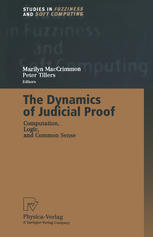

Most ebook files are in PDF format, so you can easily read them using various software such as Foxit Reader or directly on the Google Chrome browser.
Some ebook files are released by publishers in other formats such as .awz, .mobi, .epub, .fb2, etc. You may need to install specific software to read these formats on mobile/PC, such as Calibre.
Please read the tutorial at this link: https://ebookbell.com/faq
We offer FREE conversion to the popular formats you request; however, this may take some time. Therefore, right after payment, please email us, and we will try to provide the service as quickly as possible.
For some exceptional file formats or broken links (if any), please refrain from opening any disputes. Instead, email us first, and we will try to assist within a maximum of 6 hours.
EbookBell Team

4.7
86 reviewsFact finding in judicial proceedings is a dynamic process. This collection of papers considers whether computational methods or other formal logical methods developed in disciplines such as artificial intelligence, decision theory, and probability theory can facilitate the study and management of dynamic evidentiary and inferential processes in litigation. The papers gathered here have several epicenters, including (i) the dynamics of judicial proof, (ii) the relationship between artificial intelligence or formal analysis and "common sense," (iii) the logic of factual inference, including (a) the relationship between causality and inference and (b) the relationship between language and factual inference, (iv) the logic of discovery, including the role of abduction and serendipity in the process of investigation and proof of factual matters, and (v) the relationship between decision and inference.